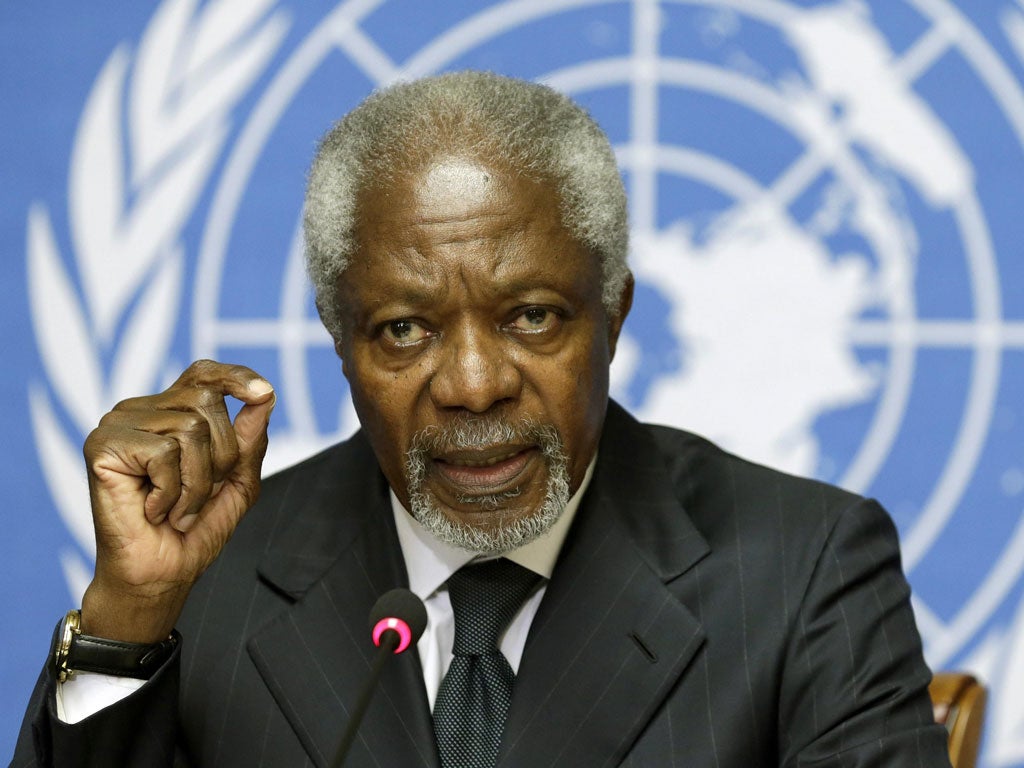Kofi Annan washes hands of Syria 'mission impossible'
Seasoned negotiator's broadside highlights crisis at the UN

With his plan to end the blood-letting in shreds, Kofi Annan yesterday quit as peace envoy for Syria, describing his task as impossible and leaving further diplomatic efforts rudderless.
The UN-Arab League envoy condemned the deadlock in the international community and blamed "finger-pointing and name-calling" at the UN Security Council for his departure. Though many regarded his mission as a poisoned chalice, analysts say he failed to wield the diplomatic muscle necessary to foster a resolution.
The Nobel laureate initially managed to rally support for his six-point plan from Syria, Russia and the West. But despite the presence of UN observers on the ground, the violence has escalated into a full-blown civil war, with divisions in the Security Council preventing any meaningful censure of the Syrian regime as it ignored its commitments to a ceasefire.
Thousands of people have died since the Syrian government said it would accept Mr Annan's plan in March. Yesterday, the diplomat said he would not continue in his post after his mandate expires at the end of the month.
More accounts of mass executions emerged last night, with 77 people reported killed in the Damascus suburbs of Yalda and Jdeidet Artouz as the regime boasted that it had killed and arrested dozens of militants.
"When the Syrian people desperately need action, there continues to be finger-pointing and name calling in the Security Council," Mr Annan said at a press conference in Geneva. "It is impossible for me or anyone to compel the Syrian government and also the opposition to take the steps to bring about the political process.
"As an envoy, I can't want peace more than the protagonists, more than Security Council or the international community, for that matter."
Mr Annan's reputation has taken a blow since he assumed the mantle of UN envoy for Syria in February. Chosen for the role because of his history of working with President Bashar al-Assad, Mr Annan has become the target of vitriol on the streets of Syria, where protesters have vented their frustrations by chanting against his plan – arguing that it has allowed the regime more time to kill. Protests across the country last month were held to call for the removal of Mr Annan, "a servant of Assad and Iran".
The former UN Secretary-General is no stranger to controversy, having headed the UN peace-keeping department through massacres in Rwanda and Bosnia. "He is a man of gravitas who has the ability to bring together international leaders, but the situation in Syria is unique and brutal," said Salman Shaikh, a Syria expert at the Brookings Institution in Washington DC. "Faced with a rising body count, this situation required from the outset pretty muscular diplomacy, and Kofi is a conciliator."
Mr Annan insisted it was the Syrian regime and its continued "intransigence" that deserved the blame for the failure of the peace effort. He also levelled criticism at Russia and China for their vetoes at the Security Council.
As the British Prime Minister, David Cameron, met the Russian President, Vladimir Putin, in London to press him over his stance on Syria, Moscow said it would block another draft resolution penned by Saudi Arabia, which removed threats of sanctions and a call for President Assad to step aside.
With the Annan plan dead and efforts at the UN Security Council hitting a brick wall, the international community is looking at alternative channels to foster change, as the government and rebels lie locked in a deadly battle for the country's second city of Aleppo.
President Barack Obama approved $12m in humanitarian aid for Syrian civilians, as it emerged that he has signed a secret order allowing the CIA to provide support to Syrian rebels. The US is already understood to be sharing some intelligence about the location of Assad's troops with the opposition, and has provided $25m in "non-lethal" assistance.
It is understood to be working with Saudi Arabia, Qatar and Turkey to provide support through a secret "nerve centre" on the Turkish border.
No path to peace: Plans that failed
Kofi Annan's six-point plan is the latest peace effort to crumble. A watered-down timetable for change was criticised by opposition figures last month for being vague about whether President Assad would be allowed a role in the transition.
"Friends of Syria" meetings developed as an alternative diplomatic framework in the face of Russian and Chinese vetoes at the UN. Under an Arab League peace plan put forward in December 2011, the regime allowed observers in. But the mission was suspended in January after it was accused of providing the regime with "cover" to continue killing with impunity.
Join our commenting forum
Join thought-provoking conversations, follow other Independent readers and see their replies
Comments